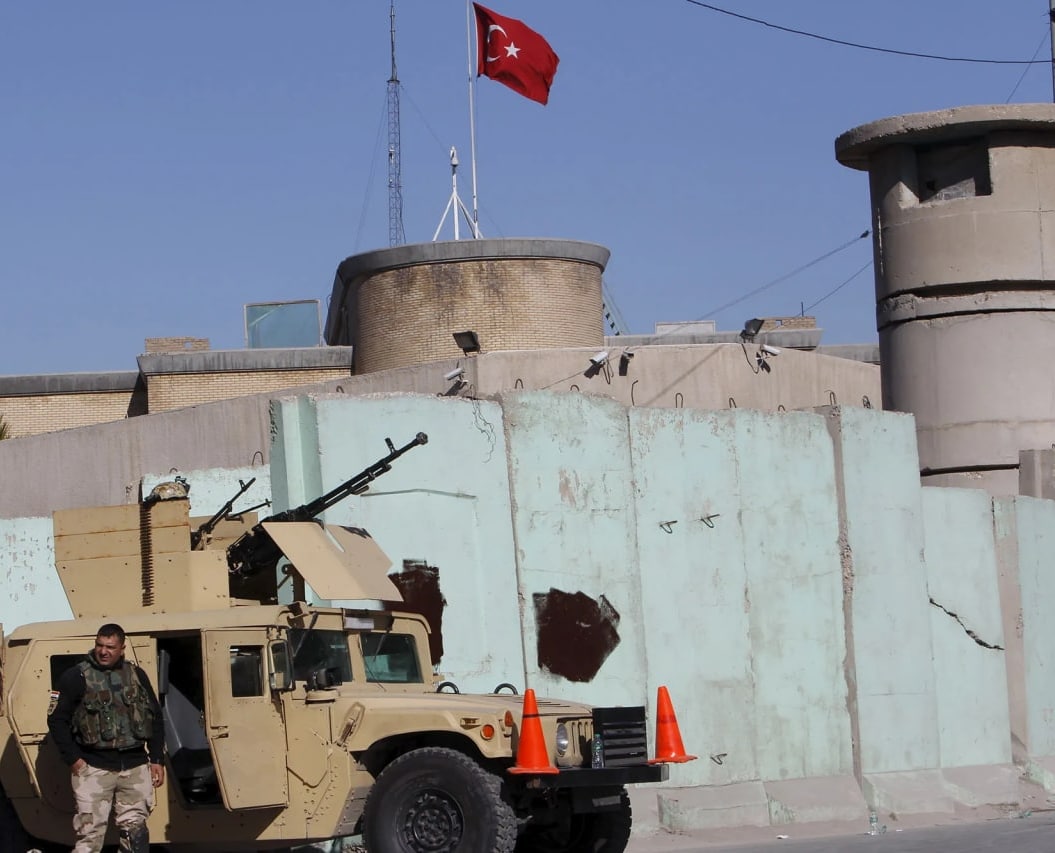The Turkish consulate in Mosul was the subject of an attack on the 27th of July, in tandem with a similar strike on the Turkish base of Zlikan, in the town of Bashiqa, east of Mosul, where a number of Turkish forces are deployed. A group calling itself “Saraya Ababil” claimed responsibility for the attack on the Turkish base. This indicates that some Iraqi factions have anti-Turkish sentiments and are seeking to send a message to the Turkish armed forces and the AKP government that they are capable of challenging the Turkish presence in Iraq, despite all the security measures and military bases Turkiye has established in northern Iraq.
This is the first time a Turkish diplomatic delegation has been targeted in Iraq. The attack coincided with the UN Security Council meeting arranged at Iraq’s request to discuss the attack on the mountain resort of Zakho, for which Iraq put the blame on Turkiye. The latter has denied responsibility for the attack on the tourist resort, blaming the Kurdistan Workers Party (PKK), which Turkiye accuses of undermining progress in Iraq-Turkey relations.
The Iraqi position
It is worth noting that there has been growing discontent among Iraqi elites regarding Turkish military presence in northern Iraq. For example, on 28 July, Iraq’s Foreign Minister condemned the illegitimate presence of Turkish military forces on Iraqi territory, as well as the Turkish Parliament’s decision last October to extend their country’s presence in Iraq for two years.
The attack on the tourist resort in the Kurdistan region was regarded as a significant blow to Iraqi authorities and to Iraqi sovereignty. It also had a destabilizing effect on the country’s already volatile political climate, prompting sharp condemnations of Turkiye by various Iraqi political forces, and calls for the adoption of plans to halt repeated Turkish military incursions into Iraqi territory. These condemnations also came from pro-Iranian Shiite factions, who seek to demonstrate that they have the capacity to protect Iraq’s national security.
The attacks on Turkey’s consulate in Mosul and its military base in the Bashiqa reveal that anti-Turkish factions in Iraq have various means to destabilize Turkish presence. Drones were used to target the Zlikan base, while remotely guided missiles were used to target the Turkish consulate in Mosul. It is worth noting that Iraq’s political and security organs have not expressed regret following these attacks, nor have they announced any discovered motives behind them. This has led some observers to conclude that authorities in Baghdad, and perhaps even in Kurdistan, are seeking behind the scenes to contain the Turkish presence, or at least put limits on it, without entering into a direct confrontation with Turkiye, so as not to jeopardize economic ties and oil interests.
Iran’s position is also of significance in this respect, as it hasn’t exhibited support for Turkish military incursions in northern Iraq, and its establishment of military bases there. Nor does Iran approve of the manner in which Turkiye is exploiting the security agreement it signed with Iraq in 2007 to strengthen its presence within Iraqi territory. Thus, Tehran may have sought through its proxies in Iraq to undermine Turkish plans to take advantage of the period of political volatility Iraq is going through.
The Turkish response
Following the attacks, the Turkish Foreign Minister called on Iraqi authorities to protect diplomats according to the Geneva Conventions. Ankara adopted a somewhat cautious tone,
and stressed the importance of cooperation with Iraqi authorities in combating terrorist organizations. It also accused the Kurdistan Workers’ Party of targeting Turkish diplomatic and security interests in Iraq, stating that the organization is a threat to neighboring countries and diplomatic missions. The Turkish Ministry of Defense, on its part, made somewhat more strident declarations, threatening the “terrorists” with destruction, but it also expressed being open to cooperation with Iraqi authorities in the fight against terrorism and in ensuring border security.
Moreover, Ankara sought to exploit the attack on the consulate domestically, against the political Kurdish forces inside Turkiye, especially as the parliamentary elections are scheduled the middle of next year. The Turkish President and his party are apprehensive regarding the rising popularity of the HDP (political wing of the Kurdistan Workers’ Party) inside Turkey. Turkiye’s Kurds have lately achieved a visible political presence on the Turkish street at the expense of the ruling party, which is under public pressure due to worsening living conditions and declining economic indicators.
In conclusion, reactions to the recent attacks suggest that the current state of tension between Baghdad and Ankara is likely to continue. The two countries face a number of contentious issues, including strong objections by Baghdad to Turkish “militarization” of the problems in northern Iraq, which it considers to be a violation of Iraqi sovereignty. These objections are also shared by the regional neighbor, Iran.
The growing tension between the two countries is also related to worsening water scarcity, and Iraq’s objections to the building of more dams in Turkiye on the Tigris and Euphrates rivers, without regard for Iraq’s rights and its share in the waters of these two rivers. However, mutual interests between the two countries may prevent a break in relations, as Ankara and Baghdad are linked by trade volumes approaching USD9 billion, not to mention the dependence of Iraq’s Kurdistan region on Turkish ports to export its petroleum products.


